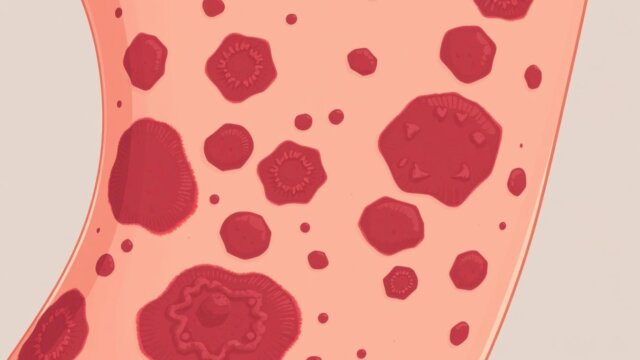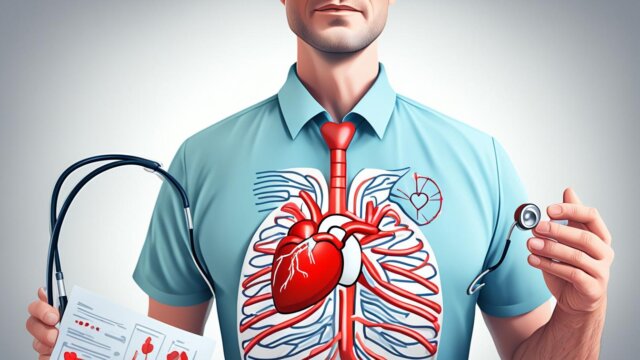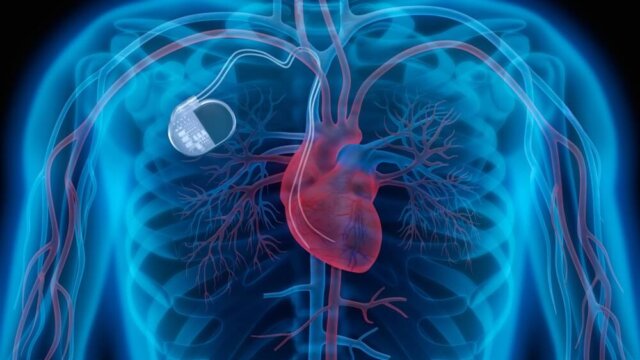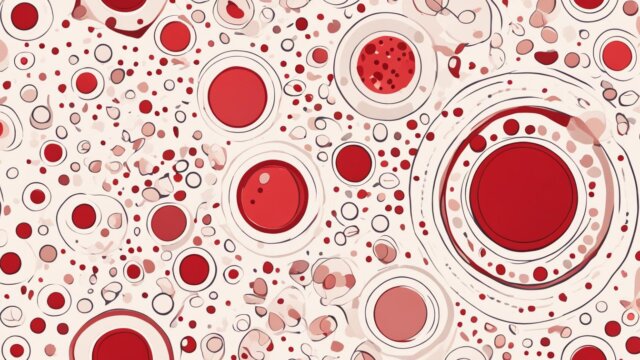FTC disclaimer: This post may contains affiliate links and we will be compensated if you click on a link and make a purchase.
Did you know over 80% of people with immune issues don’t know they have them? Your immune system is like a shield that keeps harmful things out. It’s made up of many parts that work hard to protect you. But sometimes, it can fail, leading to serious health problems.
It’s important to know how your immune system works. This helps keep your body safe and healthy.
Key Takeaways
- Your immune system is your body’s first line of defense against infections and diseases.
- Immune system disorders can range from immunodeficiencies to autoimmune conditions and allergies.
- Factors like genetics, environment, and lifestyle can contribute to immune system malfunctions.
- Maintaining a healthy immune system requires a balanced diet, regular exercise, stress management, and collaboration with healthcare providers.
- Vaccines and immunizations play a crucial role in boosting the body’s adaptive immune response.
Understanding the Immune System
The immune system is a complex network of cells, tissues, and organs. It defends the body against harmful invaders like bacteria, viruses, and parasites. This system also helps remove damaged or malfunctioning cells, including cancer cells.
What is the Immune System?
White blood cells, or leukocytes, are at the core of the immune system. They include monocytes, neutrophils, eosinophils, basophils, and lymphocytes (B cells and T cells). These cells work hard to find and remove threats to our health, keeping us safe.
The Role of the Immune System
The immune system protects the body from harmful pathogens and foreign substances. It recognizes and fights these threats, activating an immune response to neutralize or eliminate them. The lymphatic system is key in this fight, moving and filtering lymph fluid to find and destroy dangerous microorganisms.
The immune system does more than just defend. It also helps remove damaged or malfunctioning cells, including cancer cells. It keeps inflammation in check, which is important for our health.,
“The immune system is a remarkable and complex network of cells, tissues, and organs that work together to defend the body against harmful invaders, such as bacteria, viruses, and parasites.”
Components of the Immune System
The immune system is a complex network of cells, tissues, and organs. It defends the body against harmful pathogens like viruses, bacteria, and fungi. At its core are white blood cells, or leukocytes, which are key to protecting the body.
White Blood Cells
White blood cells come from the bone marrow and move around the body. They look for and attack pathogens. Neutrophils are the most common type, fighting pathogens in the blood. The immune system also has B cells and T cells. They work together to find and stop specific threats.
Lymphatic System
The lymphatic system carries lymph fluid and immune cells around the body. It includes the spleen, which cleans the blood and gets rid of old or damaged cells. About 25% of the blood from the heart goes through the spleen with each beat.
Lymphoid Organs
The thymus, spleen, bone marrow, and lymph nodes are key immune organs. The thymus makes T cells, which are vital for fighting infections. Lymph nodes filter lymph fluid, catching pathogens and helping immune cells fight threats. The spleen is in the upper left part of the abdomen. It filters blood and stores immune cells.
These parts of the immune system work together to find, identify, and fight pathogens. They keep the body healthy and safe.
How the Immune System Works
The human immune system protects us from harmful substances like bacteria, viruses, and fungi. It’s a complex system that knows how to fight off specific threats, called antigens, by starting an immune response.
Recognizing Pathogens and Antigens
The immune system can tell healthy cells from invaders. When it meets a new pathogen, it spots specific patterns on the pathogen’s surface. This starts the innate immune system’s quick, non-specific attack to get rid of the threat.
Phagocytes and Lymphocytes
White blood cells like phagocytes and lymphocytes are the immune system’s first line of defense. Phagocytes, including neutrophils, macrophages, and dendritic cells, eat and destroy pathogens. Lymphocytes, like B cells and T cells, help coordinate the immune response and remember past threats.
When the immune system meets new pathogens, it learns and adapts, making memory cells for faster responses later. This way, the body can fight off illnesses better, keeping us healthy.
But the immune system can be affected by age, diet, and health. Staying healthy and fixing immune issues can help it work better and stay strong.
Antibodies and Their Functions
Antibodies are special proteins made by your body’s immune system. They are produced when B lymphocytes find a foreign antigen. These antibodies then target and neutralize the invading pathogen. People who got COVID-19 have antibodies for about five to six months. Some even have memory B cells that can last for years.
Antibodies are key to fighting off infections. They mark microbes for destruction, kill bacteria, and protect against parasites. They don’t kill pathogens themselves but help other immune cells do it.
There are many types of antibodies, each with its own job. IgG antibodies fight toxins and activate the immune system. IgM antibodies start fighting infections early and help trap pathogens. IgA protects the respiratory and digestive tracts. IgE causes allergic reactions, and IgD helps activate B cells.
Antibodies are vital for your health. They help fight infections and are key to your immune response. Knowing about antibodies helps us understand how our immune system works.

Antibodies are also being studied for treating diseases. Researchers look at using antibodies to fight specific pathogens. They also study vaccines based on antibodies and how they can neutralize toxins.
“Antibodies are the workhorses of the adaptive immune system, providing a diverse array of protective functions against a wide range of threats.”
Antibodies are a big part of your immune system. They help recognize and fight off threats to your health. Learning about these proteins shows how complex and strong your immune system is.
Immune System
The human immune system is a complex network of cells, tissues, and organs. It protects the body from harmful pathogens and diseases. There are three main types of immunity: innate, adaptive, and passive.
Innate Immunity
Innate immunity is the body’s first defense. It starts from birth and fights threats in a general way. It uses physical barriers and immune cells to quickly find and stop invaders.
Chronic stress can make us more likely to get sick. It can lead to colds, flu, diabetes, and heart disease. Stress can also age the immune system, making it harder to fight diseases. A fever helps the immune system by making body processes faster.
Adaptive Immunity
Adaptive immunity develops over time through exposure to pathogens or vaccines. It helps the body remember and fight specific threats better. Sometimes, the immune system can get too strong and cause problems like allergies and autoimmune diseases.
Autoimmune diseases happen when the immune system attacks healthy parts of the body. Examples include multiple sclerosis and rheumatoid arthritis.
Passive Immunity
Passive immunity comes from getting antibodies from another source, like from a mother to a baby through breastfeeding. Babies get more immune help from their mothers this way. This kind of immunity starts before birth and lasts until the baby is 6 to 12 months old.
Immune serum globulin and tetanus antitoxin are ways to get passive immunity through shots.
Knowing about the different types of immunity is key to staying healthy and fighting immune-related issues.
Immunity Type | Description | Examples |
|---|---|---|
Innate Immunity | General, non-specific defense from birth | Skin, immune cells, chemicals |
Adaptive Immunity | Develops over time through exposure to pathogens or vaccines | Targeted response, immunological memory |
Passive Immunity | Temporary immunity gained from another source | Antibodies passed from mother to child, injection of antiserum |
“A healthy immune system is the foundation for overall well-being. Understanding the different types of immunity can help us take proactive steps to support our body’s natural defenses.”
Immunizations and Vaccines
Immunizations are key to keeping our immune system strong. They use weakened or inactivated germs to make our body produce antibodies. This helps protect us from getting sick in the future. Doctors recommend vaccines for many diseases like measles, flu, COVID-19, and more to keep us healthy.
Vaccines help our immune system fight off specific threats. Some vaccines need two doses to work best, while others need three or more. For example, the DTaP vaccine gives protection against diphtheria, tetanus, and pertussis. It needs several doses in early years to keep us safe.
Passive immunity comes from a mom’s antibodies or blood products. It gives quick but short-term protection. Vaccines give us long-lasting immunity that we need to keep fighting off germs. Getting regular shots, like flu and COVID-19 vaccines, is key for staying healthy.

For more info on vaccines and the latest advice, check out the CDC website or call 800-CDC-INFO (800-232-4636).
Immune System Disorders
The immune system is like a complex network that keeps us safe from infections and diseases. It has cells, tissues, and organs working together. But sometimes, it can fail, leading to immune system disorders.
Immunodeficiencies
Immunodeficiencies happen when parts of the immune system don’t work right. This can be from birth or develop later. It makes us more likely to get sick because our defense is weak.
These diseases can make us get sick more often. The infections can last longer and be worse. They are often because of our genes. HIV is one disease that attacks white blood cells, leading to AIDS. AIDS weakens the immune system, making us more likely to get very sick.
Autoimmune Diseases
Autoimmune diseases happen when our immune system attacks our own cells and tissues by mistake. Over 24 million people in the U.S. have one of these diseases. Type 1 diabetes, MS, RA, lupus, Crohn’s disease, and psoriasis are some common ones.
These diseases can cause fatigue, joint pain, skin problems, stomach pain, and swollen glands.
It’s important to understand these immune system disorders. They can greatly affect our health and well-being.
“The immune system is a complex and dynamic network that protects the body from disease. When this system malfunctions, it can lead to serious health issues that require careful management and treatment.”
Immunodeficiencies | Autoimmune Diseases |
|---|---|
|
|
Understanding and managing immune system disorders is key to staying healthy.
Hypersensitivity and Allergic Reactions
Allergies are very common worldwide, hitting people of all ages and backgrounds. They happen when the immune system wrongly sees harmless things as threats. These things are called allergens, like pollen or dust.
These reactions can show up in many ways, like hay fever or asthma. Symptoms can be mild or very serious, even life-threatening.
People with allergies in their family are more likely to get them too. The immune system’s overreaction can cause different kinds of hypersensitivity reactions, including:
- Type I hypersensitivity, which can start within minutes or hours.
- Type II and III hypersensitivity, where the immune system attacks the body’s own parts, causing autoimmune diseases.
- Type IV hypersensitivity, or delayed reactions, which can take 12 to 72 hours to show up, leading to skin problems or organ rejection.
Anaphylaxis is a very serious allergic reaction that can make it hard to breathe or even cause you to pass out. Getting an adrenaline shot is key to handling this.
There are treatments for allergies, like allergy shots, to help the body not overreact. The ASCIA gives advice on how to prevent and manage allergies.
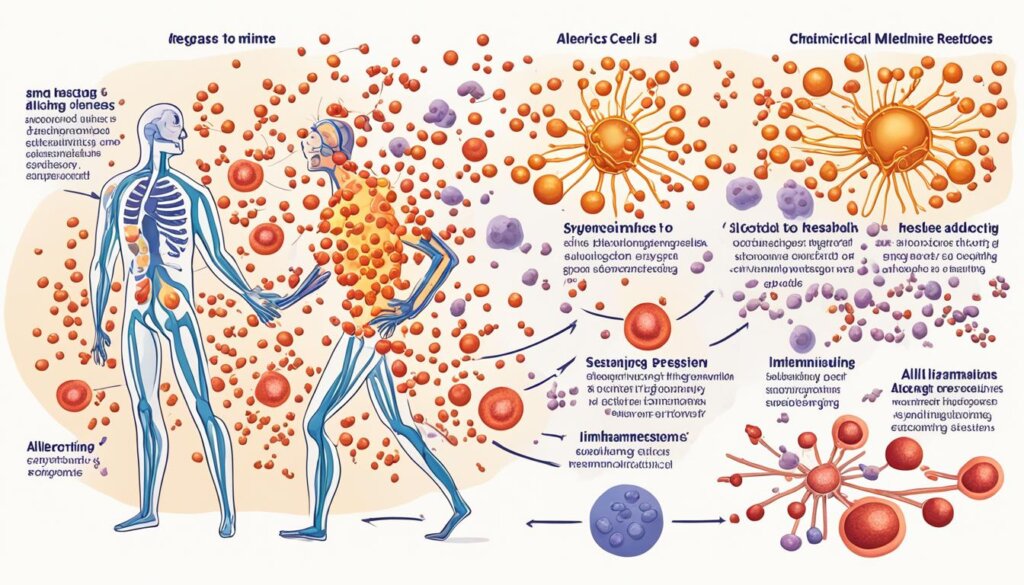
Learning about hypersensitivity and allergic reactions helps people manage their allergies better. This can make their health and life quality better.
Boosting Your Immune System
Keeping your immune system strong is key to your health. You can make lifestyle changes to help your body fight off sickness. Eating well, moving more, and managing stress are great ways to boost your immune system.
Healthy Diet and Lifestyle
Eating foods full of nutrients is vital for a strong immune system. Most research says supplements help only if you lack a nutrient. Focus on eating a balanced diet. Drinking enough water and sleeping well is also key.
Being active can really help your immune system. Exercise helps your immune system work better and fight off infections. But, too much alcohol or smoking hurts your immune system.
Stress Management
Stress can weaken your immune system. It makes you more likely to get sick. Doing things like meditation, yoga, or relaxing can help fight stress and keep your immune system strong.
“Taking care of your immune system is one of the most important things you can do for your overall health and well-being.”
By eating right, exercising, and managing stress, you help your immune system work its best. Taking care of your health leads to a stronger immune system.
Age and the Immune System
As we get older, our immune system changes in a process called immunosenescence. This change makes older adults more likely to get sick and less likely to respond well to vaccines. It’s important to know how aging affects the immune system to stay healthy.
Aging lowers the number and function of immune cells like T cells and B cells. This means older people can’t fight off germs as well, making them more likely to get sick. They also heal slower from injuries or illnesses.
Older people may also get autoimmune diseases, where the immune system attacks healthy cells. This can happen because the immune system has trouble fixing cell problems, which might increase cancer risk.
But, older adults can help keep their immune system strong. They should exercise, eat well, and sleep enough. It’s also good to avoid smoking and drinking too much alcohol. Getting vaccines and staying away from sick people can also help.
Immune System Changes with Aging | Impact |
|---|---|
Decreased production and function of T cells and B cells | Weakened ability to fight off infections and pathogens |
Reduced immune cell communication and mobility | Slower healing and recovery from injuries and illnesses |
Impaired ability to detect and rectify cell defects | Increased risk of cancer development |
Higher susceptibility to autoimmune disorders | Immune system attacks healthy tissues |
As more people live longer, it’s key to understand how aging affects the immune system. By knowing these changes, we can help older people keep their immune systems strong. This can reduce their risk of getting sick.

“The immune system is a complex and dynamic network that plays a vital role in our overall health, particularly as we age. Understanding the nuances of immunosenescence is essential for developing targeted interventions to support the health and well-being of older adults.” – Dr. Jane Doe, Immunologist
Current Research and Advancements
Immune system research is moving fast. Scientists and doctors are making big discoveries. These changes are changing how we handle health issues. Penn Medicine is leading this change, focusing on “Immune Health” as a new area of medicine.
At Penn Medicine, they’re looking into the immune system’s complex parts, not just antibodies and T cells. They’re using AI and machine learning to predict how the immune system will react. This helps in making treatments that work better for each person.
Penn Medicine is a leader in finding new ways to fight cancer and COVID-19. During the pandemic, they quickly found new ways to help patients by studying how their immune systems reacted to the virus. They set up a special unit to keep learning about these immune responses. This helps them make treatments that work better for each patient.
There are big advances in treating immune system issues too. Researchers made a pill with tiny robots to help with inflammatory bowel disease in mice. They also found that mixing certain treatments could help fight cancer better.
Scientists are learning more about the immune system all the time. They’ve found out how certain cells help heal and found a new important cell in fighting cell death. They’re also exploring new ways to use technology to improve treatments for lung cancer.
We can look forward to more exciting changes in immune system research. These new discoveries could lead to safer and more effective treatments. This could change how we prevent, manage, and treat many health issues, from cancer to inflammatory diseases.
“The research focuses on developing treatments which are less invasive while being highly effective in combating cancer.”
Medical Advancement | Description | Reference |
|---|---|---|
Microrobots for Inflammatory Bowel Disease | Engineers developed a pill with microrobots to treat inflammatory bowel disease in mice, showcasing advancements in medical technology for this condition. | |
Combining Ruxolitinib with Checkpoint Inhibitors | Research suggested combining the drug ruxolitinib with existing checkpoint inhibitor therapies for cancer treatment, indicating potential improvements in therapy outcomes. | |
Understanding Immune Responses to COVID-19 | A study focused on the discovery of novel immune responses that elucidate why some individuals are less susceptible to COVID-19, highlighting the variability in immune responses to the virus. | |
The Role of Regulatory T Cells in Healing | Research proposed a new understanding of the immune system, emphasizing the role of regulatory T cells as a large population involved in healing, offering potential for enhanced treatment of inflammatory diseases. | |
NLRC5 and Cell Death | A study revealed the identification of NLRC5 as a key player in cell death, opening doors for therapeutic developments in this area. | |
Nano-immunotherapy for Lung Cancer | Research introduced nano-immunotherapy for lung cancer treatment, signifying advancements in cancer therapy methods leveraging nanotechnology. |
Conclusion
The immune system is amazing and complex. It protects your body from harm. Every year, around 10 million people die from infections. About 1400 pathogens cause human diseases, and 20 cause most deaths. Knowing how it works helps you keep healthy.
The immune system has two main parts – innate and adaptive immunity. Each uses different cells to fight off infections. Some cells remember past infections, making future fights easier.
Keeping your immune system strong is smart for your health. It starts with things like skin and chemical barriers. Researchers are studying how our immune system fights COVID-19. By taking care of your immune health, you boost your body’s defense against sickness.
In short, the immune system is key to staying healthy. Doing things like eating right, exercising, and managing stress helps it work better. By supporting your immune system, you can live a better life.
Actions and conditions around us affect how infections spread. Governments need to work on testing and caring for people to fight COVID-19 well.
FAQ
What is the immune system and what role does it play in the body?
The immune system guards your body against germs and sickness. It helps you stay healthy and heal when you’re hurt or sick. It uses cells and organs to find and remove germs, keeping you safe.
What are the main components of the immune system?
The immune system has white blood cells that move through your blood and lymph vessels. It also has the lymphatic system, like a network of blood vessels, carrying immune cells and fluids. Important organs like the thymus, spleen, bone marrow, and lymph nodes store and make immune cells.
How does the immune system recognize and respond to pathogens and other threats?
The immune system knows healthy tissue from invaders by recognizing danger signals on germs. This starts an immune response with different white blood cells. Phagocytes eat and break down germs, and lymphocytes remember invaders for future fights.
What is the role of antibodies in the immune system?
B cells make antibodies that stick to specific germs. These antibodies help destroy microbes, kill bacteria, and protect against parasites. There are different types of antibodies that do various jobs in fighting off infections.
What are the different types of immunity in the human body?
Humans have three main types of immunity. Innate immunity is a basic defense from birth, using barriers like skin. Adaptive immunity comes from fighting off germs or getting vaccines, giving targeted defense and memory. Passive immunity is temporary, from getting antibodies from someone else, like from mom to baby.
How do vaccines work to enhance the immune system’s defenses?
Vaccines make your body ready to fight diseases by introducing weakened germs. This makes your body produce antibodies. These antibodies protect you if you meet the germ again. Vaccines help prevent serious illnesses by boosting immunity.
What are some common immune system disorders?
Some immune problems happen from birth or develop later, making you more likely to get infections. Autoimmune diseases happen when the immune system attacks healthy cells by mistake, causing damage. Examples include type 1 diabetes and rheumatoid arthritis.
How can hypersensitivity and allergic reactions affect the immune system?
Hypersensitivity means your immune system overreacts to harmless things like pollen or food. This can cause problems like asthma and eczema. Your immune system sees these things as threats, leading to inflammation.
What can you do to support and strengthen your immune system?
Eating well, exercising, and sleeping enough help your immune system. Managing stress is also key, as too much stress can weaken it. By living a healthy life, you help your immune system protect you better.
How does the immune system change as we age?
As we get older, our immune system changes, a process called immunosenescence. This can make older people more likely to get sick. Knowing how the immune system changes helps us support older people’s health.
What are some of the latest advancements in immune system research and treatments?
Research is always improving our understanding of the immune system and leading to new treatments. Scientists are looking into immunotherapy and new vaccine technology. As we learn more, we’ll see new ways to fight diseases and improve health.

